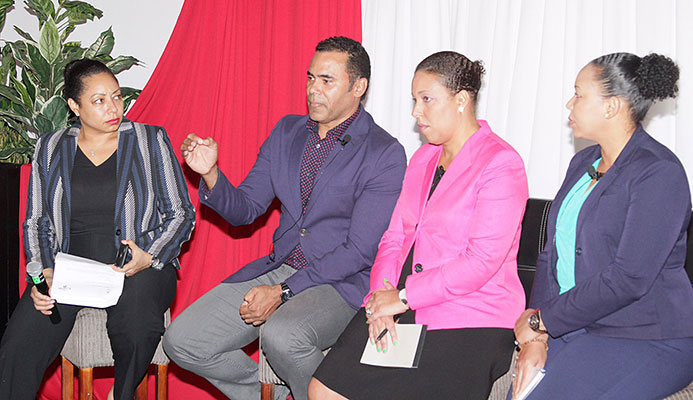Local stakeholders in the sporting industry were urged to be bold, get serious and treat sport as a business, at last Thursday's Future of Sport Conference hosted by the Trinidad and Tobago Olympic Committee (TTOC) at Normandie Hotel, St Ann's.
Dr Terrence Farrell, chairman of the Economic Development Advisory Board, and former Deputy Governor of Central Bank, was the feature speaker at the conference, providing advice, figures and valuable information on the role sport can play in helping diversify the stuttering TT economy.
Speaking on the issue of diversification, Dr Farrell said: "The generation of foreign exchange earnings is the right focus in the circumstances of excessive dependence on exports of oil, gas and petrochemicals and the presumption that global demand for all of these products will be declining in the long term and that the competitive advantage of the firms producing these products from Trinidad and Tobago will erode over time."
On seeking diversification, he indicated that one must be innovative and not limit one's self to one's resources.
"One very big question we have to address is ‘diversify into what?’ This reduces to asking: ‘How is global demand evolving and in what areas can we meet that demand?’ You might note that I am not asking: ‘What do we have that we can sell to the rest of the world?’ I am asserting that our diversification strategy must be demand-driven rather than supply-driven."
On the role of Government in the diversification thrust, Dr Farrell believes, "Government has to get the macroeconomic balance right; it has to promote the right incentives and apply the right disincentives to shape private sector behaviour; it has to regulate markets efficiently and fairly and, in limited areas of strategic significance, it should be investor or co-investor in certain business opportunities. Its role is active and dynamic, but in respect of developing and serving market demand, supportive and not leading."
And the local private sector? "It has better management capability, stronger marketing skills, superior discernment of business opportunities than does Government, and it has access to some amount of capital. The private sector
understands the global marketplace, albeit mostly as importers, distributors and franchisees. Its weaknesses are that, with few exceptions, it has not taken the risks of selling into or investing overseas, and it is largely oblivious to the need for R&D and technological innovation, because its businesses have never required them to be innovative. Far too many are completely reliant on government spending for their business success. But I think it is better for us to work with the private sector to overcome its weaknesses and enhance their strengths than to condemn them as merely parasitic and exploitative. "
Also present to share their input and knowledge of succeeding in the business world was a wide cross-section of local entrepreneurs.
Candace Guppy, director of Candy Coated Events and Candy Coated Travels, who is known for hosting several popular Carnival events, said the hardest part of her journey was starting.
"Find ways to be new and innovative. Bring fresh ideas and concepts," she said, noting that the entertainment and party industry is quite saturated, which encouraged the birth of Candy Coated Travels.
Sajjad Hamid, a senior lecturer at COSTAAT with over a decade of experience teaching and consulting to the Small and Medium Sized Enterprises (SME) sector, said eliminating fear of failing is essential in taking the first step to creating a business model. He argued that being an entrepreneur is not risky business.
"High risks are gamblers. Start small in taking risks. Try an experiment and see how the world reacts to your product or service," he said.
Operating at a loss initially is also not a major deterrent, he noted, adding: "When you come up with an idea you are ahead of the market so the first year may be a struggle."
Another key element he said in deciding which market to get into is asking yourself two questions.
"Where is the money? How do I get to it?" he said.
Discussing the topic of "Protecting the Idea and Other Legal Issues for the Entrepreneur" was a panel consisting of entertainment and sports lawyer Carla Parris, Barbadian international trade and development consultant Alicia Nicholls and Shymal Chandradathsingh, vice president of Investor Sourcing at invesTT.
Nicholls lamented that in the Caribbean, the issue of Intellectual Property (IP) is grossly overlooked by entrepreneurs.
"You don't want to put in all that investment for someone to come and steal your idea or trade on your name," she pointed out.
The panel discussed options for persons seeking funding from large corporations for projects but who are wary of companies rejecting their proposal but taking their business plan.
Parris said non-disclosure agreements can be used in such instances but warned against just copying examples from the internet as each would be unique depending on the industry. She added that trust is important among all parties and revealing just enough details on the project to attract the investor is crucial.
Parris, who operates out of Marie de Vere Chambers in Port-of-Spain and has a Master’s Degree in Entertainment Law, has been employed as a consultant for the United National World Intellectual Property Organisation and has worked with a number of local athletes in TT. She said expanding one's earning potential by building a brand off the field is something all athletes should seek to do. She cited former England footballer David Beckham, who has earned more from selling cologne, underwear and other merchandise than from football.
She also touched on the issue of "brain drain" in this country, which she said needs to be addressed. She said qualified local personnel are often treated and paid less than foreigners even though they have the same experience in the industry. She added that for local industries to grow, this must stop.
Stephon Nicholas

